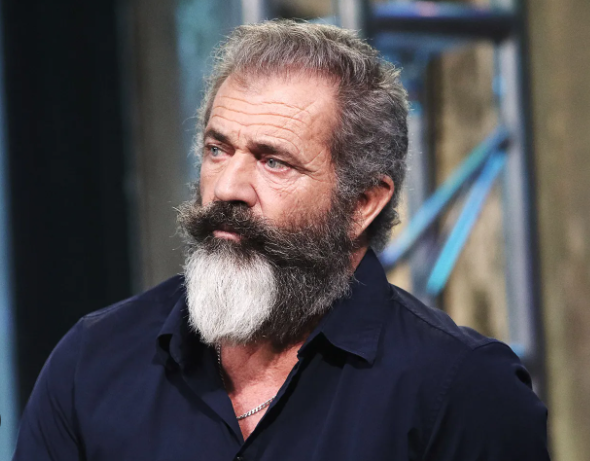Ask most people about their biggest fear, and the response might surprise you. Public humiliation often ranks number one.
For Mel Gibson, however, fear seems irrelevant as he boldly confronts one of Hollywood’s most contentious issues: woke culture.
Gibson, known for iconic roles in films like Braveheart and Mad Max, has once again stirred debate, this time not just for his on-screen presence but for challenging Hollywood’s politically correct status quo.
Mel Gibson vs. Woke Culture: Creativity or Censorship?
In recent discussions, including a resurfaced six-year-old interview with actor John Lithgow, Gibson passionately criticized what he describes as woke culture’s detrimental impact on creativity.

Initially viewed as a movement advocating social justice, Gibson argues woke culture has transformed into an oppressive force that stifles artistic freedom, labeling it a “creativity-crushing silence.”
He asserts that the Hollywood establishment is quick to silence or cancel voices that stray from accepted narratives.
“If one of their priests utters something that resembles orthodoxy, they spring into action,” Gibson stated, highlighting an environment where genuine creativity is replaced by fear and conformity.
Sound of Freedom: Breaking Hollywood’s Silence
Mel Gibson’s involvement with the film Sound of Freedom underscores his commitment to challenging industry taboos.

The film boldly addresses the uncomfortable and deeply troubling reality of child trafficking in Latin America—a topic typically avoided by major studios due to fears of controversy or backlash.
From its inception, Sound of Freedom faced resistance from studios wary of its confronting subject matter. Nevertheless, Gibson and the filmmakers behind the project remained steadfast.
Rather than succumbing to pressure, they utilized alternative release strategies, generating continuous buzz and conversation long after its debut.
Not only did the film achieve substantial box-office success, but it also sparked critical debates on Hollywood’s moral compass, shining a harsh spotlight on industry hypocrisy.
Hollywood’s Backlash and Media Attacks
The industry’s reaction to Sound of Freedom underscores the tensions Gibson highlights. Mainstream media outlets quickly launched critical attacks, labeling the film controversial due to its direct challenge to established Hollywood norms.
Critics accused it of pandering to conspiracy theories or attempting to undermine social justice efforts, underscoring the deep polarization within the industry.
Yet, Gibson remains undeterred. In a recent interview, he reiterated his belief that Hollywood prioritizes image and political correctness over authentic storytelling.

He noted the industry’s selective outrage, pointing out its silence on genuine societal issues, like child trafficking, unless it aligns neatly with their narrative.
The Controversy Behind Sound of Freedom
The film itself boldly explores the grim realities of child trafficking in Latin America, a topic Hollywood traditionally avoids.
Gibson emphasized the uncomfortable reality depicted in the film, pointing out the alarming involvement of seemingly non-threatening individuals, rather than stereotypical figures often portrayed in media.
“Recruiters weren’t weird dudes in masks; it was non-threatening individuals—a woman, a young person,” Gibson explained, drawing attention to a disturbing authenticity rarely depicted on screen.
Hollywood’s Double Standards: Cancel Culture vs. Real Accountability
Mel Gibson’s outspoken views highlight broader issues within Hollywood regarding selective accountability.
He has criticized the industry’s double standards, where cancel culture swiftly punishes certain individuals while conveniently overlooking problematic behaviors from others when convenient.

This perceived hypocrisy becomes evident when comparing the industry’s response to Gibson with reactions to other prominent figures.
When accusations surface against mainstream stars like Dwayne “The Rock” Johnson, Hollywood’s silence or passive response contrasts sharply with the swift backlash Gibson often faces.
A History of Provoking Thought and Debate
Mel Gibson’s willingness to address controversial or politically sensitive topics isn’t new. His previous directorial effort, Hacksaw Ridge, told the real-life story of Desmond Doss, a conscientious objector who saved lives during World War II without bearing arms.
Like Sound of Freedom, Hacksaw Ridge challenged conventional Hollywood narratives, emphasizing authentic storytelling over politically correct box-ticking.
The response was overwhelmingly positive, earning Gibson critical acclaim and an Oscar nomination.
The film highlighted his commitment to storytelling that pushes boundaries and provokes meaningful conversations.

Upcoming Project: The Return of Gibson’s Bold Vision
Gibson’s next anticipated project, deeply rooted in Christian themes, is the sequel to his controversial 2004 film, The Passion of the Christ.
The forthcoming movie, expected to be titled Resurrection, is predicted to ignite debate once more by directly engaging Christian themes often avoided by Hollywood.
This commitment to controversial storytelling cements Gibson’s reputation as a filmmaker unafraid of backlash.
The industry, traditionally resistant to projects that might generate public discomfort, braces itself for another polarizing release, with anticipation building over the film’s potential impact.
Celebrity Support Amid Controversy
Interestingly, despite the controversies surrounding Gibson, he maintains strong support from industry colleagues.
Robert Downey Jr., notably, has openly praised Gibson for offering personal support during difficult times, emphasizing his underlying compassion and loyalty.
Downey Jr. publicly acknowledged Gibson’s role during his darkest periods, suggesting a deeper, more nuanced figure beneath Gibson’s often contentious public image.

Impact and Future Implications
Mel Gibson’s ongoing clash with Hollywood’s woke culture represents more than just a personal struggle; it’s a battle over the soul of creativity within the entertainment industry.
His stance underscores the critical importance of freedom of expression, even amidst potential backlash.
This defiance resonates with a growing audience dissatisfied with Hollywood’s prioritization of political correctness over genuine storytelling.
Gibson’s refusal to be silenced is inspiring to those feeling alienated by the industry’s increasingly narrow ideological focus.
Hollywood’s response to figures like Gibson suggests the future of entertainment may hinge on this tension between traditional storytelling and social accountability. As the industry faces growing scrutiny, Gibson’s bold approach is pushing Hollywood to reconsider its priorities.
Ultimately, whether Mel Gibson is seen as a visionary disrupting a complacent Hollywood or as disconnected from the industry’s evolving values remains subjective.
However, his unwavering commitment to confronting difficult truths and challenging Hollywood’s entrenched beliefs undeniably shapes conversations within and beyond the entertainment world.


